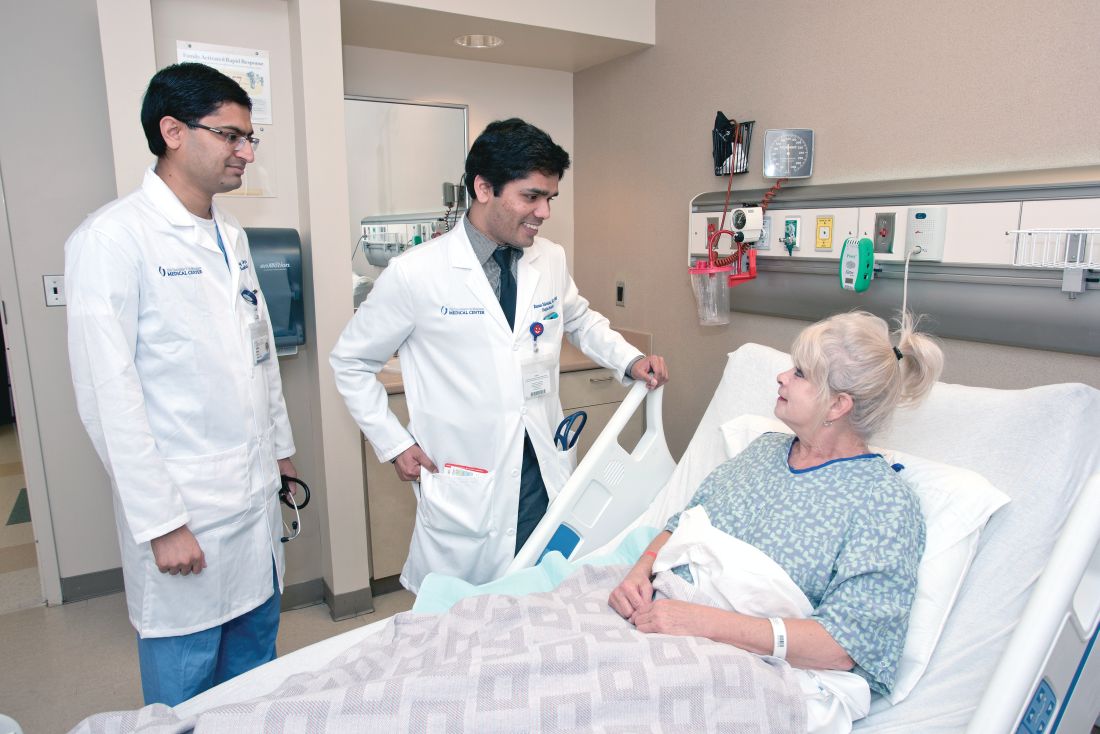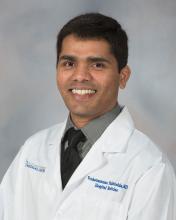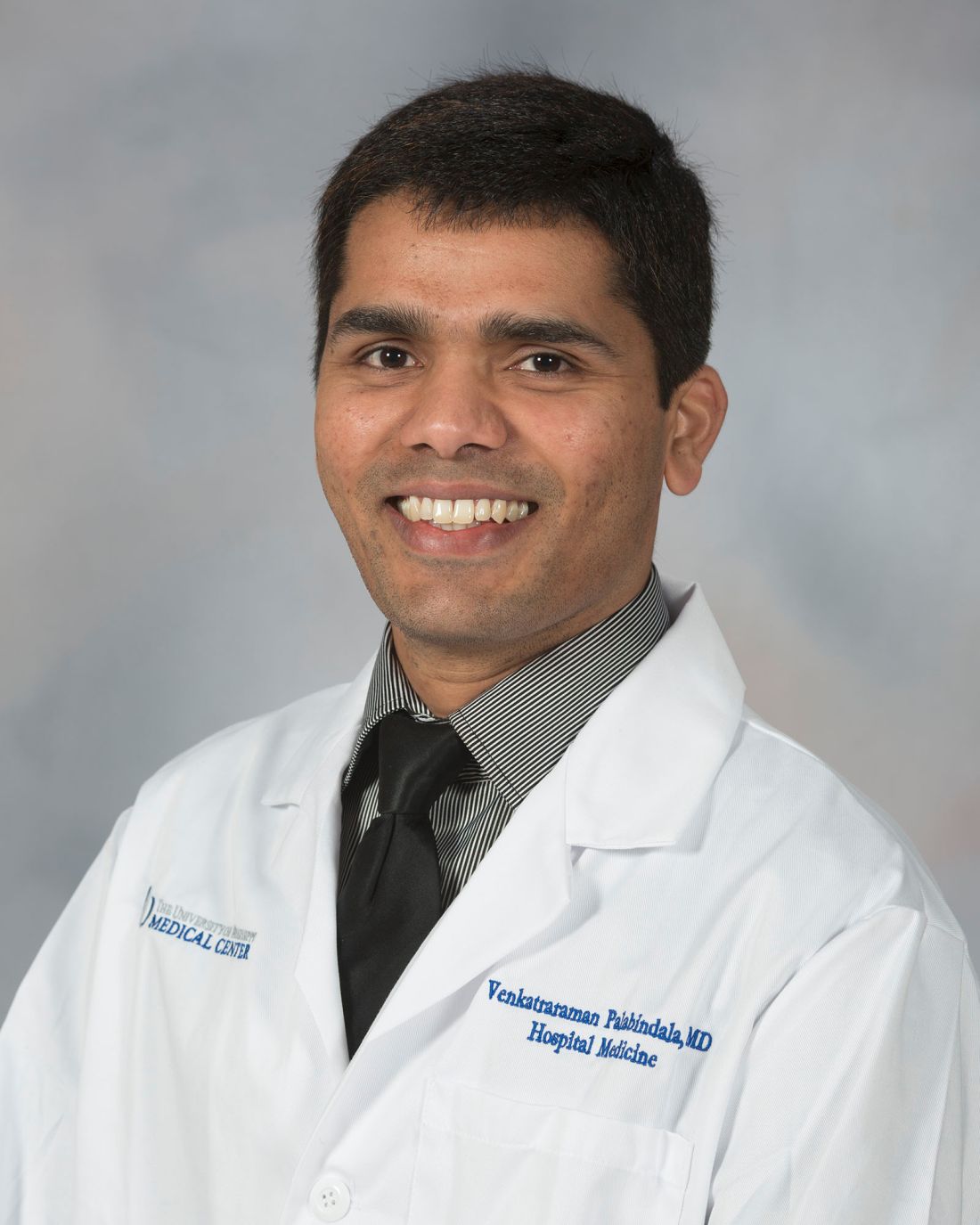User login
Venkatraraman “Raman” Palabindala, MD, FACP, SFHM, was destined to be a doctor since his first breath. Born in India, his father decided Dr. Palabindala would take the mantle as the doctor of the family, while his siblings took to other professions like engineering.
Eager to be in the thick of things, Dr. Palabindala has voraciously pursued leadership positions, leading to his current role as chief of the Division of Hospital Medicine at the University of Mississippi Medical Center, Jackson.
Dr. Palabindala is enthusiastic about his role as one of the eight new members of The Hospitalist editorial advisory board, and took time to tell us more about himself in a recent interview.
Q: How did you get into medicine?
A: It’s all because of my dad’s motivation. My father believed in education, so when I was born, he said, “He’s going to be a doctor,” and as I grew up, I just worked towards being a physician and nothing else. I didn’t even have an option of choosing anything else. My dad said that I would be a doctor, and I am a doctor. I feel like that was the best thing that happened to me, though; it worked out well.
Q: How and when did you decide to go into hospital medicine?
A: After I came to the U.S., I joined residency in internal medicine at GBMC – that’s Greater Baltimore Medical Center – it’s affiliated with Johns Hopkins. I always wanted to be an internist, but my experiences in the clinic world were not so great. But I really enjoyed inpatient medicine, so in my 3rd year, when I was doing my chief residency year, I did get opportunities to join a fellowship, but I decided just to be a hospitalist at that time.
Q: What do you find to be rewarding about hospital medicine?

Q: What is one of the biggest challenges in hospital medicine?
A: I think talking about the business aspect of medicine, because it is like a taboo. We don’t really want to talk about whether the patient is covered or not covered by insurance, how much we are billing, and why we must discuss business issues while we are trying to focus on patient care, but these things are going to indirectly affect patient care, too. If you didn’t note the patient status accurately, they are going to get an inappropriate bill.
Q: What’s the best advice you have received that you try to pass on to your students?
A: Do the rounds at the bedside. We have the tendency of doing everything outside and then going in the room and just telling the patient what we are going to do. Instead, I encourage everyone to be at the bedside. Even without students, I go and sit at the bedside and then review the data in terms the patient can understand, and then explain the care plan, so they actually feel like we are at the bedside for a longer time. We are with the patient for at least 10 to 15 minutes, but at the same time, we are getting things done. I encourage my students and residents to do this.
Q: What is the worst advice you’ve received?
A: I don’t know if this is the “worst” advice, but in my second year, I was trying to take some leadership positions and was told I should wait, that leadership skills come with experience. I do think that’s a bad piece of advice. It’s all about learning how hard you work and then how fast you learn, and then how fast you implement. People who work, learn, and implement quickly can make a difference.
Q: Outside of patient care, what other career interests do you have?
A: I’m interested in smart clinics, and I actually have a patent for smart clinic chains. I’m a big fan of primary care, because, like hospitalists revolutionized inpatient care, I think we can revolutionize the outpatient care experience as well. I don’t think we are being very efficient with outpatient care.
But if I was not practicing medicine, I probably would be a chef. I like to cook, and I would open up my own restaurant if I was not doing this.
Q: Where do you see yourself in 10 years?
A: I want to be a consultant, evaluating hospitalist programs and guiding programs to grow and be more efficient. That, I think, would be the primary job that I would like to be doing, along with giving lectures and teaching about patient safety and quality, and educating younger physicians about the business of medicine.
Q: What experience with SHM has made the most lasting impact on you?
A: I would say the best impression was from the Academic Hospitalist Academy meeting I attended in Denver. I think that was helpful, because it was like a boot camp where you have only a limited number of attendees with a dedicated mentor. That was amazing, and I learned a lot. It helped me in redesigning my approach to where I would like to be both short- and long-term. I implemented at least 50 percent of what I learned at that meeting.
Q: What’s the best book that you’ve read recently and why was it the best?
A: Being Mortal by Atul Gawande. It’s a really beautiful book.
[email protected]
On Twitter @eaztweets
Venkatraraman “Raman” Palabindala, MD, FACP, SFHM, was destined to be a doctor since his first breath. Born in India, his father decided Dr. Palabindala would take the mantle as the doctor of the family, while his siblings took to other professions like engineering.
Eager to be in the thick of things, Dr. Palabindala has voraciously pursued leadership positions, leading to his current role as chief of the Division of Hospital Medicine at the University of Mississippi Medical Center, Jackson.
Dr. Palabindala is enthusiastic about his role as one of the eight new members of The Hospitalist editorial advisory board, and took time to tell us more about himself in a recent interview.
Q: How did you get into medicine?
A: It’s all because of my dad’s motivation. My father believed in education, so when I was born, he said, “He’s going to be a doctor,” and as I grew up, I just worked towards being a physician and nothing else. I didn’t even have an option of choosing anything else. My dad said that I would be a doctor, and I am a doctor. I feel like that was the best thing that happened to me, though; it worked out well.
Q: How and when did you decide to go into hospital medicine?
A: After I came to the U.S., I joined residency in internal medicine at GBMC – that’s Greater Baltimore Medical Center – it’s affiliated with Johns Hopkins. I always wanted to be an internist, but my experiences in the clinic world were not so great. But I really enjoyed inpatient medicine, so in my 3rd year, when I was doing my chief residency year, I did get opportunities to join a fellowship, but I decided just to be a hospitalist at that time.
Q: What do you find to be rewarding about hospital medicine?

Q: What is one of the biggest challenges in hospital medicine?
A: I think talking about the business aspect of medicine, because it is like a taboo. We don’t really want to talk about whether the patient is covered or not covered by insurance, how much we are billing, and why we must discuss business issues while we are trying to focus on patient care, but these things are going to indirectly affect patient care, too. If you didn’t note the patient status accurately, they are going to get an inappropriate bill.
Q: What’s the best advice you have received that you try to pass on to your students?
A: Do the rounds at the bedside. We have the tendency of doing everything outside and then going in the room and just telling the patient what we are going to do. Instead, I encourage everyone to be at the bedside. Even without students, I go and sit at the bedside and then review the data in terms the patient can understand, and then explain the care plan, so they actually feel like we are at the bedside for a longer time. We are with the patient for at least 10 to 15 minutes, but at the same time, we are getting things done. I encourage my students and residents to do this.
Q: What is the worst advice you’ve received?
A: I don’t know if this is the “worst” advice, but in my second year, I was trying to take some leadership positions and was told I should wait, that leadership skills come with experience. I do think that’s a bad piece of advice. It’s all about learning how hard you work and then how fast you learn, and then how fast you implement. People who work, learn, and implement quickly can make a difference.
Q: Outside of patient care, what other career interests do you have?
A: I’m interested in smart clinics, and I actually have a patent for smart clinic chains. I’m a big fan of primary care, because, like hospitalists revolutionized inpatient care, I think we can revolutionize the outpatient care experience as well. I don’t think we are being very efficient with outpatient care.
But if I was not practicing medicine, I probably would be a chef. I like to cook, and I would open up my own restaurant if I was not doing this.
Q: Where do you see yourself in 10 years?
A: I want to be a consultant, evaluating hospitalist programs and guiding programs to grow and be more efficient. That, I think, would be the primary job that I would like to be doing, along with giving lectures and teaching about patient safety and quality, and educating younger physicians about the business of medicine.
Q: What experience with SHM has made the most lasting impact on you?
A: I would say the best impression was from the Academic Hospitalist Academy meeting I attended in Denver. I think that was helpful, because it was like a boot camp where you have only a limited number of attendees with a dedicated mentor. That was amazing, and I learned a lot. It helped me in redesigning my approach to where I would like to be both short- and long-term. I implemented at least 50 percent of what I learned at that meeting.
Q: What’s the best book that you’ve read recently and why was it the best?
A: Being Mortal by Atul Gawande. It’s a really beautiful book.
[email protected]
On Twitter @eaztweets
Venkatraraman “Raman” Palabindala, MD, FACP, SFHM, was destined to be a doctor since his first breath. Born in India, his father decided Dr. Palabindala would take the mantle as the doctor of the family, while his siblings took to other professions like engineering.
Eager to be in the thick of things, Dr. Palabindala has voraciously pursued leadership positions, leading to his current role as chief of the Division of Hospital Medicine at the University of Mississippi Medical Center, Jackson.
Dr. Palabindala is enthusiastic about his role as one of the eight new members of The Hospitalist editorial advisory board, and took time to tell us more about himself in a recent interview.
Q: How did you get into medicine?
A: It’s all because of my dad’s motivation. My father believed in education, so when I was born, he said, “He’s going to be a doctor,” and as I grew up, I just worked towards being a physician and nothing else. I didn’t even have an option of choosing anything else. My dad said that I would be a doctor, and I am a doctor. I feel like that was the best thing that happened to me, though; it worked out well.
Q: How and when did you decide to go into hospital medicine?
A: After I came to the U.S., I joined residency in internal medicine at GBMC – that’s Greater Baltimore Medical Center – it’s affiliated with Johns Hopkins. I always wanted to be an internist, but my experiences in the clinic world were not so great. But I really enjoyed inpatient medicine, so in my 3rd year, when I was doing my chief residency year, I did get opportunities to join a fellowship, but I decided just to be a hospitalist at that time.
Q: What do you find to be rewarding about hospital medicine?

Q: What is one of the biggest challenges in hospital medicine?
A: I think talking about the business aspect of medicine, because it is like a taboo. We don’t really want to talk about whether the patient is covered or not covered by insurance, how much we are billing, and why we must discuss business issues while we are trying to focus on patient care, but these things are going to indirectly affect patient care, too. If you didn’t note the patient status accurately, they are going to get an inappropriate bill.
Q: What’s the best advice you have received that you try to pass on to your students?
A: Do the rounds at the bedside. We have the tendency of doing everything outside and then going in the room and just telling the patient what we are going to do. Instead, I encourage everyone to be at the bedside. Even without students, I go and sit at the bedside and then review the data in terms the patient can understand, and then explain the care plan, so they actually feel like we are at the bedside for a longer time. We are with the patient for at least 10 to 15 minutes, but at the same time, we are getting things done. I encourage my students and residents to do this.
Q: What is the worst advice you’ve received?
A: I don’t know if this is the “worst” advice, but in my second year, I was trying to take some leadership positions and was told I should wait, that leadership skills come with experience. I do think that’s a bad piece of advice. It’s all about learning how hard you work and then how fast you learn, and then how fast you implement. People who work, learn, and implement quickly can make a difference.
Q: Outside of patient care, what other career interests do you have?
A: I’m interested in smart clinics, and I actually have a patent for smart clinic chains. I’m a big fan of primary care, because, like hospitalists revolutionized inpatient care, I think we can revolutionize the outpatient care experience as well. I don’t think we are being very efficient with outpatient care.
But if I was not practicing medicine, I probably would be a chef. I like to cook, and I would open up my own restaurant if I was not doing this.
Q: Where do you see yourself in 10 years?
A: I want to be a consultant, evaluating hospitalist programs and guiding programs to grow and be more efficient. That, I think, would be the primary job that I would like to be doing, along with giving lectures and teaching about patient safety and quality, and educating younger physicians about the business of medicine.
Q: What experience with SHM has made the most lasting impact on you?
A: I would say the best impression was from the Academic Hospitalist Academy meeting I attended in Denver. I think that was helpful, because it was like a boot camp where you have only a limited number of attendees with a dedicated mentor. That was amazing, and I learned a lot. It helped me in redesigning my approach to where I would like to be both short- and long-term. I implemented at least 50 percent of what I learned at that meeting.
Q: What’s the best book that you’ve read recently and why was it the best?
A: Being Mortal by Atul Gawande. It’s a really beautiful book.
[email protected]
On Twitter @eaztweets

